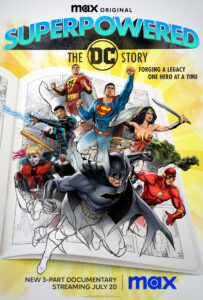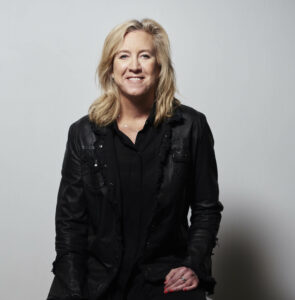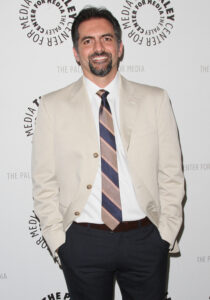
Leslie Iwerks and Mark Catalena spoke with Solzy at the Movies about their new DC Comics documentary, Superpowered: The DC Story.
The three-part documentary series is narrated by Rosario Dawson and features sixty new and archival interviews with actors, filmmakers, creators, and executives. Iwerks and Catalena take an unprecedented look at the history of DC Comics over the course of three hours. As Catalena tells Solzy at the Movies, this documentary series could easily have been six hours. We’re talking about a company rich in comic book history dating back to some 85 years ago but I’d certainly have watched it! The documentary comes on the heels of the four-part 100 Years of Warner Bros. so Iwerks and Co. have been keeping busy.
Since the founding of DC Comics, their properties have moved beyond just being in print. There have been serials, cartoons, feature films, and TV series. You can’t discuss the films and TV series without bringing it back to the source material and the creators who bring the work to life. As Catalena says, you could make separate documentaries about some of the characters and creators that they cover in the doc series. Personally speaking, three episodes is not enough but they do a solid job with the time they have.
New and archival interviews include Melissa Benoist, Greg Berlanti, Tim Burton, Mike Carlin, Lynda Carter, Henry Cavill, Kaley Cuoco, Gal Gadot, James Gunn, Patty Jenkins, Dwayne Johnson, Michael Keaton, Regina King, Zoë Kravitz, Jim Lee, Zachary Levi, Damon Lindelof, Tom Mankiewicz, Jason Momoa, Christopher Nolan, Robert Pattinson, Christopher Reeve, John Ridley, Margot Robbie, Bruce Timm, Michael E. Uslan and Mark Waid, among others.
Superpowered: The DC Story starts streaming today on Max.

What was the genesis behind Superpowered: The DC Story?
Leslie Iwerks: Well, I was approached by Warner Brothers after they saw The Imagineering Story on Disney+, our six hour series on the history of the theme parks, and they said, Would you be interested in doing something like that for DC? They also asked for me to do something on the 100 years of Warner Brothers, which we just finished and aired about a month or so ago. We basically took on both of these projects kind of simultaneously for the most part. They both kind of ramped up virtually around the same time in development and then one went into production sooner, which was DC, finished a little sooner, and the other one overlapped after that. That was the genesis and then Mark, who I collaborated with on The Imagineering Story, unbeknownst to me, is and has been a huge DC Comics fan all these years so we were the perfect team to take on the enormous project of scaling down eight-plus decades of history into three hours.
I’m sure that was not easy.
Mark Catalena: (Laughs) No.
Leslie Iwerks: Take it away. Mark. How easy was it?
Mark Catalena: No, I mean, it wasn’t. Of course, we want everything in there. We want everything. Each one of these little stories could have its own documentary so yeah, that was tough. I do think it was great. Like Leslie just mentioned, our backgrounds—we assembled a team that with a big mix of there was really hardcore fans to people that really didn’t know anything about it. I think that gave us a good perspective. It helped us with what to include, what not to include, what makes sense, what is too inside baseball to the comic fans only. It’s probably a good barometer to kind of keep us on track.
Yeah. I was just watching the film this afternoon and I loved the footage of all the Batmans, Supermans, Wonder Women, Jokers, etc.
Mark Catalena: Yeah, yeah, it’s fun. There are so many we could have even added to that but we just don’t have the time.

Speaking of time, how long was the initial cut?
Leslie Iwerks: We were very disciplined. We were only a few minutes, I guess, over our first hour that we had to do. We had a very tight schedule to make this film so e really had no choice but to say each episode has to come in right around time because we don’t have excess time to cut it down.
Mark Catalena: Yeah. I would say on our wish list and on paper, that’s where our cuts were long. We could have done it double. We could have done six hours but once we got into the actual video and constructing it, we were pretty good. Each one had to be an hour. We e were only gonna be a couple of minutes over, each episode.
Was there anything in the company’s history that you couldn’t include because of timing?
Mark Catalena: Plenty? Yeah, tons. (Laughs)
Leslie Iwerks: I was gonna say I don’t know what our ratio is from archival material that we’d love to include to what we were able to include, but I would say it’s at least, what, 30 to one, if not more.
Mark Catalena: Yeah, so much. I mean, there’re characters we wanted in that we couldn’t. There were people, creators we wanted in but didn’t have time. You name it. I mean, there’re a lot of things. I think you just kind of have to pick your battles and keep it moving, but then also not kind of repeat, right? Of course, for instance, I’ll just use a pretty obvious example. We love, obviously, Alan Moore. We have an archival interview of him in there but we, of course, had to deal with Watchmen. But dealing with Alan Moore and Watchmen, that almost immediately meant, oh, well, we can’t deal with Alan Moore’s run on Swamp Thing. It kind of dilutes that little narrative arc. We just looked at each beat in that way and had to pick and choose.
How did you balance time with working on both this documentary and the recent Warner Brothers documentary?
Leslie Iwerks: Well, I mean, it was a challenge. I’m just coming out of it now after two years of insanity so I’m just glad to be here (Laughs), as Mark and I would say, and have survived both. I think that Mark really took the lead on DC and I took the lead on Warner Brothers but we both worked on both, obviously. I think that it was a challenge because of the timeframe of DC—it was a very tight schedule and budget. It was also shot during Covid so we were shooting on both coasts. We had to have actors come to us on the soundstages where we could and then we had to have remote crews filming on sets where they could for the interviews that only they could do, because we couldn’t travel there. There were a lot of logistics with DC that by the time we were filming on Warner Brothers, which was summer last year, we started—some of that was lifted, but not all of it. But then, that schedule got really crunched, too, so I think it was just a lot of racing. Mark Catalena: Yeah. I would also add, we were able to do it because we had two big crews that were separate and they were dedicated to one or the other. It wasn’t like everybody worked on both so I think that was the other reason why we were able to do it.
What was the most surprising thing you learned while making the documentary?
Leslie Iwerks: I guess for me, I hadn’t known as much that Mark knew, having grown up around DC Comics, but what I think was just interesting to me personally—I’m a filmmaker who loves stories where you’ve got the convergence of innovation, business and creativity—those three things melding together and finding historical narrative within that is kind of the sweet spot of projects that I’ve done already, whether it be Pixar, Disney, Hearst, Imagineering, that’s been something that’s been a fun story to tell. With DC, you’ve got the business story, which I didn’t really know all the ups and downs to this history where you had these near death experiences with DC in the comic book industry as a whole. But ultimately, how DC would constantly reinvent themselves and push ahead. Again, it’s these near death experiences that I felt like DC was constantly doing and constantly reinventing themselves. And to me, that was probably the thing that really rose above all else. But in addition to that is the evolution of the of the craft, the creativity, and the evolution of these characters and how they just how they evolved so differently each time there was a new iteration. There was just a lot to take in. It was really fun. It was very inspiring. Go ahead, Mark.
Mark Catalena: No, you got it. That was good. Well said.
Leslie, your family has a history in the entertainment industry as old as Warner Brothers. What are the most important things that you’ve learned from your grandfather, Ub Iwerks, and your father, Don Iwerks?
Leslie Iwerks: Well, Warner Brothers in and Disney are both 100 years old this year—2023—and I’m involved with both in different ways. I think what’s interesting to me was the boldness of these young men who came out in the early 20s to pioneer an art form. Ub Iwerks and Walt Disney coming out to create the Disney Brothers Studio and the formation of The Walt Disney Company, and ultimately, my grandfather co-creating and designing Mickey Mouse and leading to so many things he did with Walt through his career. It’s an interesting story, again, of creativity, innovation, and business all blending together.
I think with Warner Brothers, it was very similar in that you got these four brothers who pretty much came out with no money and just said, we’re going to rival the best guys out there in the business and let’s do whatever we can to make it happen and ultimately ended up innovating through the sound technology that revolutionized the industry. From that came, across town, Steamboat Willie, the first sound cartoon. These guys were constantly standing on each other’s shoulders. They were constantly innovating and constantly pioneering and I just think that that’s a really cool story. When you look at it over 100 years, you really get to see the scope of our country through the backgrounds of these films and it’s really inspiring.

What do you hope people take away from watching the documentary series?
Mark Catalena: I think one of our main goals is just having people that might just be a casual fan of the movies and TV shows to get a greater appreciation of the source material where all these ideas came from, especially today with what’s going on in our industry about the value of ideas. It’s key, I believe, to point—look, cinema has been revered and respected forever. Let’s shine a little bit of light on comic books and the creators and the ideas and where this stuff comes from because it’s now being tapped into for cinema. I feel like that, to me, is the big takeaway if people just have a greater appreciation for these writers and artists doing it on the comic book page.
Leslie Iwerks: I just want to shout out Mark, who worked so hard on the show, and just really, I think we both have a sensibility for this type of material that has a heart to it. There’re people who have a passion to do something and there’s underdogs, and unsung heroes in this story and those are the kinds of people we want to bring out and celebrate. We also want to make this honest and tell the most honest story we can, warts and all. We’re really thrilled that we can work with these companies and these subjects who trust us to do that with their beloved IP and that nothing is perfect, and we’re all imperfect and by these lessons learned, it makes for a more interesting story.
Thank you so much and it was so nice to meet you.
Leslie Iwerks: I want to say, Danielle, good job on your Oppenheimer review today.
Oh, thank you. I didn’t even know you read it!
Leslie Iwerks: I did, yeah.
Mark Catalena: Awesome.
Leslie Iwerks: I can’t wait to see that movie.
Mark Catalena: Thank you so much.
Max launches Superpowered: The DC Story on July 20, 2023.
Please subscribe to Solzy at the Movies on Substack.



